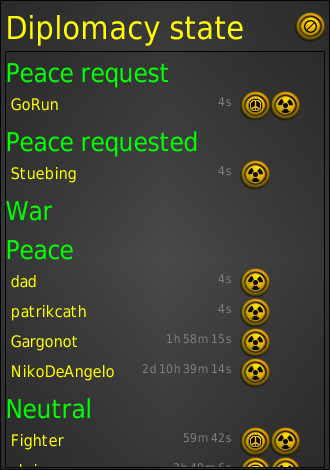Main menu
You are here
10. Diplomacy

Diplomacy
In order to establish diplomatic relations with another player, you must first meet them. To meet another player entails having one of your units be adjacent to a city or unit of that player.
Once you have met another player, you can engage in diplomacy with them as follows:

Diplomacy state dialog
Diplomats and spies
Once your advances provide you with diplomats, and later with spies, you can observe and manipulate other civilizations more subtly than is possible with simple military observation and intervention. Both units are fragile and must move cautiously — often under guard — to survive. The more aggressive actions can spark a diplomatic incident if perpetrated against a civilization you're not at war with; this is sufficient provocation to allow treaties to be revoked under representative government.
Two actions require your unit to approach a lone enemy unit and attempt to enter its square (these actions cannot be attempted on a stack of units):
Bribe Unit. In exchange for gold, a foreign unit may be persuaded to join your civilization. This action doesn't work if the enemy governs as a democracy. Bribery may be attempted even when not at war, but will cause a diplomatic incident. The cost depends on several factors:increases with wealth of the enemy civilization;increases with enemy unit production cost and veterancy;decreases with enemy unit hitpoints;decreases with increasing distance from enemy capital;half if enemy unit is a Settler.
Sabotage Enemy Unit. Only the spy may sabotage an enemy unit, reducing its remaining hit points by half if successful. Sabotage may only be attempted when openly at war. After successful sabotage a spy is instantly returned to the nearest friendly city.
All other actions require your diplomatic unit to reach an enemy city alive and attempt to enter it. Diplomats can attempt only one diplomatic act, whose success or failure brings them to their end, while spies are more hardy and often survive their mission. Enemy diplomats or spies in the city will oppose any hostile action. The actions available at an enemy city are:
Make embassy. Both diplomats and spies always succeed when you ask them to establish an embassy. An embassy gives you permanent contact with that civilization. At any time your embassy can provide you with basic intelligence about their government, treasury, trade ratios, and technology. An embassy also allows you to propose pacts to the other player, as described below. Investigate city. Your unit will report the status of the city, what units and buildings are within, and what it is currently producing.Sabotage city. Your unit attempts to destroy either one of the city's buildings, or all of its work towards its current project. Diplomats will select their target randomly, but spies can be directed towards a specific goal (with a reduced chance of success). Once built, Palaces and Wonders cannot be sabotaged, and attempts to sabotage City Walls or any building in a capital each halve the chance of success. Sabotage may only be attempted when openly at war. After successful sabotage a spy is returned to the nearest friendly city.Steal Science. Your agent will attempt to steal science points. A successful spy is returned to the nearest friendly city.Incite city rebellion. In return for gold a foreign city will change allegiances and join your empire, bringing along all nearby units that call it home, but reducing its size by 1. Units in other cities remain in the enemy's control, but units outside cities are lost to both players. Incitement may be attempted even when not at war, but will cause a diplomatic incident. After inciting rebellion successfully a spy is returned to the nearest friendly city. This action doesn't work if the enemy governs as a democracy, or for capital cities. The cost depends on several factors:increases with wealth of the enemy civilization;decreases with increasing distance from enemy capital;increases with present unit and building production costs;half if city is empty;increases with city size (modified by happiness of individual citizens);half if city is in revolt or enemy civilization is in anarchydouble if city is celebrating;decreases if the city was originally yours, or (less) if it is not currently owned by its original builder; increases if city has a Courthouse.Poison city water. Only the spy can commit this atrocity, and only in war; it empties the city granary and kills one citizen. A successful spy is returned to the nearest friendly city.
Pacts
Players can make informal requests, agreements, and threats across the in-game chat channel, but to transfer actual property they must arrange a pact (and of course AI players can only negotiate through a pact). This can be done while the players have contact or may be initiated by a player who already has an embassy with the other. The window this brings up lets each player build a list of items he is offering alongside a list of what he will receive in return. These can include:
A copy of your current map — showing either all the terrain you have discovered, or just which squares are ocean and which are land without revealing specific features, or both.Technological advances you possess.Cities in your empire (except the city with your palace), which will take with them any units that call the city home.Gold from your treasury.Access to your vision — everything your cities and units can see as the game unfolds. Unlike the other items, this is a persistent ability, and must be cancelled in your player list when you no longer wish the other player to see what you are doing.An embassy.- A cease-fire, peace or alliance treaty.
Only if both players indicate satisfaction is the pact concluded and the transfer of goods made.
Diplomatic states
The default state with any player is 'Neutral'. Unlike most other diplomatic states, war is declared unilaterally by one player on another; thus, declaring war only requires that you have already met the player once or he has declared war on one of your allies.
- Neutral
- Peace
- War
(Content is available under the GNU General Public License).
Recent comments